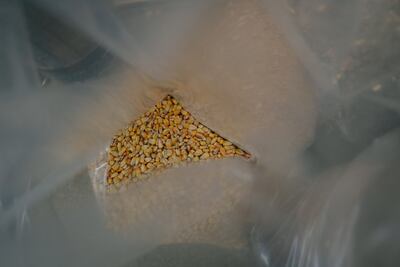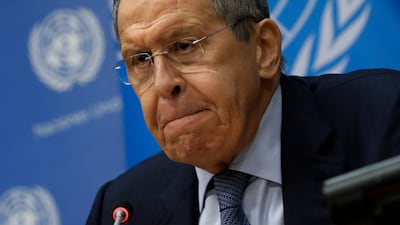Russian Foreign Minister Sergey Lavrov on Tuesday said that the Black Sea grain initiative has reached a deadlock.
Speaking at a news conference at UN headquarters in New York, Mr Lavrov told reporters the situation has not been resolved and has been “brought to a dead end by western colleagues”.
The deal allows for the reopening of blockaded Black Sea ports, with Russia allowed to inspect cargo, and permits Ukraine to export wheat, corn, sunflower oil and other agricultural products across the globe, despite the ongoing war.
It is set to expire on May 18.
Mr Lavrov confirmed that UN Secretary General Antonio Guterres had conveyed a letter to President Vladimir Putin regarding the grain deal and said there would be a response in due course.
The UN chief’s letter outlines a “proposed way forward” aimed at the improvement, extension and expansion of the initiative, “taking into account positions recently expressed by the parties and the risks posed by global food insecurity”.
A similar letter was sent to the two other signatories to the agreement, Ukraine and Turkey, according to the UN.
The grain deal was brokered by the UN and Turkey last year amid rising prices and fears over global food security.
Last month, the deal was extended for a second time, but Moscow agreed to extend it for only 60 days instead of the proposed 120 days.
The Black Sea grain initiative has, since last July, allowed the export of about 28 million metric tonnes of Ukrainian grain, in particular to poor countries bearing the brunt of the global food crisis.
On April 13, the Russian Ministry of Foreign Affairs said that Moscow sees no possibility to extend the grain deal beyond May 18 unless “five systemic problems” are resolved.
These include the reconnection of the Russian Agricultural Bank Rosselkhozbank to the Swift banking system as well as the resumption of supplies of agricultural machinery, spare parts and services to Russia.
Russia has also demanded the lifting of restrictions on insurance of Russian vessels carrying grain and lifting the ban on their access to European ports; the restoration of operation of the Tolyatti-Odesa ammonia pipeline; and the unblocking of foreign assets and accounts of Russian companies involved in the production and transport of food and fertilisers.
Oleg Ignatov, Crisis Group's senior analyst for Russia, told The National that the likelihood that Moscow will refuse to extend the grain deal after May 18 now looks “quite high”.
“The collapse of the deal, of course, would be bad in that it would end a successful format where Russians and Ukrainians could talk to each other,” said Mr Ignatov.
“This is not positive in the context of the prospect of negotiations between Kyiv and Moscow.”
When asked why Russia agreed to the deal in the first place, Mr Ignatov said Moscow had hoped to use the deal as a precedent for easing sanctions and revising the West's policy towards it.
From the onset, said Mr Ignatov, the Kremlin had the impression that the deal was “more in Ukraine's interests”.
“This was reinforced by the fact that the sanctions were never eased. Now the Kremlin thinks that Russia never got anything out of the deal.”



